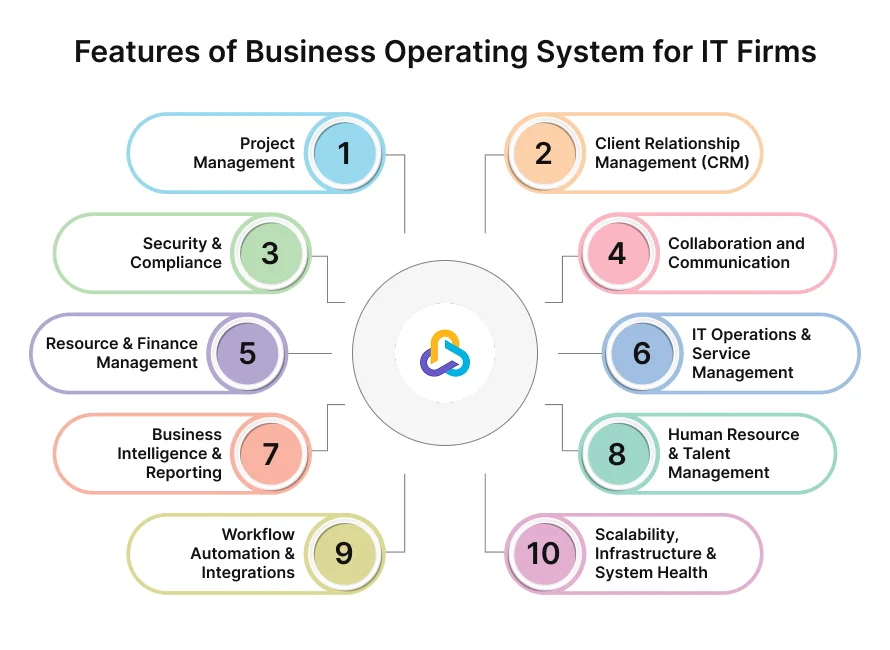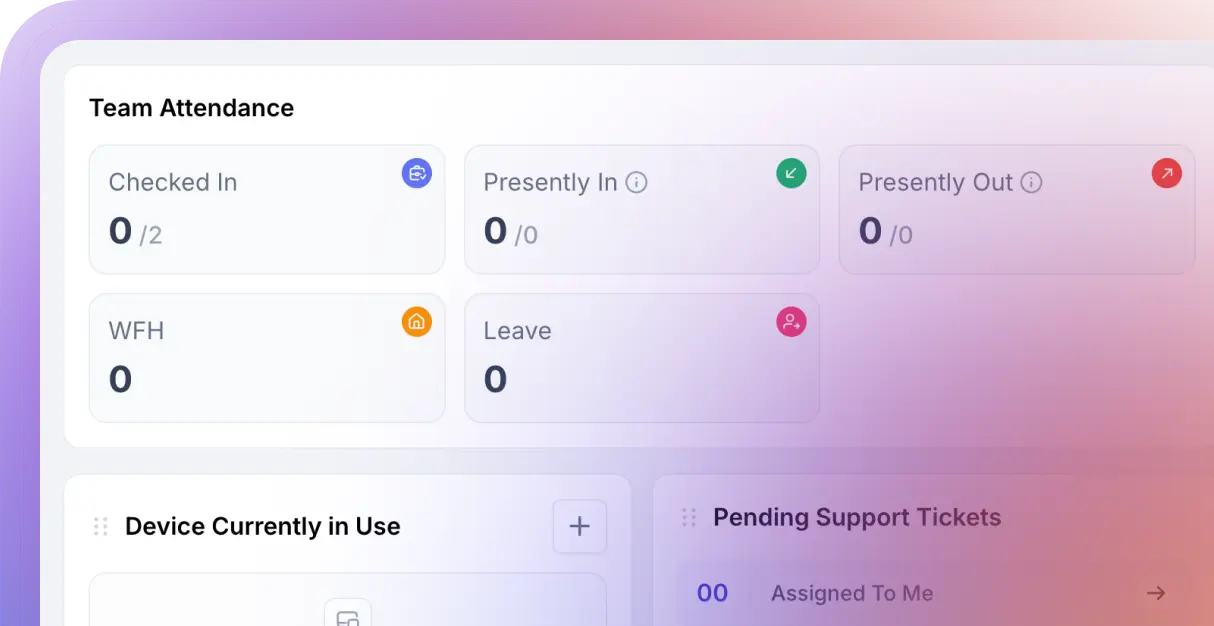Running an IT firm often feels like keeping too many plates spinning at once, from managing clients and projects to maintaining systems and compliance. However, a business operating system (BOS) helps bring it all to a centralized platform.
A BOS acts as a centralized system, connecting people, processes, and data together. For IT firms, it ensures ease of access to data for everyone across departments, enhancing visibility, accuracy, productivity, and eventually the overall profitability.

No doubt, a BOS brings about numerous benefits to the table; however, you need to check if your BOS is embedded with all the necessary features to do so. This blog explains the key features you should look for in a business operating system for IT firms. It’ll help you know everything and choose the right one for your company.
Key Takeaways
- A Business Operating System (BOS) streamlines operations and improves decision-making.
- IT firms should look for features, such as project management, CRM, security & compliance, scalability, and more in a BOS.
- The right BOS boosts productivity, enhances client satisfaction, and ensures long-term scalability and profitability.
What is a Business Operating System?
A Business Operating System (BOS) is a comprehensive platform that centralizes all critical business functions from project execution and client management to HR, finance, and analytics. It streamlines efficiency by combining different tasks and ensuring automation, seamless communication, project management, and workflow optimization.
Think of a business operating system as the control center for your organization:
- It replaces fragmented tools with a single, cohesive environment, avoiding the hidden cost of using multiple tools in ITSM.
- BOS ensures every team, from development to support, works in synchronization.
- It provides leaders with real-time visibility into performance and outcomes.
For IT firms, this means smoother project delivery, better client collaboration, and higher profitability.
BOS allows IT teams to collaborate, manage resources, keep track of progress, and maintain visibility across departments. For instance, in IT companies, the functions would be product development, IT service management, or end-to-end business management.
With business operating system software, organizations automate manual processes, minimize errors, and maximize productivity, ensuring improved business profitability.
Importance of a Business Operating System
There are many reasons why you need a business operating system; however, the main goal of it is to increase the company’s effectiveness. IT companies come across a unique mix of challenges that can efficiently be addressed through a BOS. Here’s how it does so:
| The Challenges IT Firms Deal With | The Pain Points a BOS Addresses |
| Managing multiple ongoing projects with varying timelines and client expectations | Centralizing project data and timelines to streamline planning and client coordination |
| Handling complex workflows across development, QA, deployment, and support teams | Standardizing and automating workflows across all IT functions |
| Meeting strict security, data governance, and compliance requirements | Providing built-in compliance controls, security frameworks, and audit-ready data |
| Relying heavily on skilled personnel for knowledge sharing and process continuity | Capturing organizational knowledge and automating tasks to reduce dependency on individuals |
Simply put, when an IT company has implemented a BOS, the system empowers that firm to work smarter, not harder, ensuring fewer hassles with more productivity.
Key Features to Look for in a Business Operating System for IT Firms
The key features of an IT firm’s business operating system include project management, client relationship management (CRM), workflow automation, and robust security features. The system should also integrate communication tools, support scalability, and offer a user-friendly interface for both employees and clients. Here’s how!

1. Project Management
For IT firms, project management is at the heart of operations. A robust BOS should simplify project planning, task tracking, and product delivery. A well-developed operating system for IT companies includes robust features for managing projects, from initial scope to final delivery, ensuring projects stay on track, on budget, and conveniently meet clients’ expectations.
When choosing a business operating system, organizations should consider ensuring that the system offers support for:
- Agile, Scrum, and Kanban support,
- Resource and time management
- Project templates and repeatable workflows
- Occupancy report
Why It Matters: A BOS embedded with these features ensures every project stays on track, within scope, and on budget, leading to happier clients and higher team efficiency.
2. Client Relationship Management (CRM)
A BOS is a complete work management software that is integrated with CRM capabilities to help maintain client relationships. It ensures clear communication, transparency, and trust, enabling businesses to nurture relations with clients. For a smoother CRM, you should look for the following features in a business operating system:
- Lead and opportunity management
- Centralized client database and communication history
- Contract, proposal, and SLA management
- Client portals for updates and deliverables
Why It Matters: An integrated CRM strengthens client relationships, improves retention, and aligns project delivery with their expectations.
3. Security & Compliance
With growing cybersecurity threats and stricter data regulations, IT firms must treat security as a foundational feature of their business operating system. The security & compliance feature in a BOS is of paramount significance for IT as it offers a basic framework to protect critical assets, meet legal and regulatory obligations, and build client trust.
The very feature moves IT companies from a reactive to a proactive security posture by offering essential controls and processing directly into daily operations. Here are what to look for when you want a business operating system for IT that ensures security:
- Role-based access controls (RBAC)
- Data encryption and secure storage
- Automated audit trails and activity logs
- Compliance tracking for ISO, SOC 2, or GDPR
Why It Matters: It ensures that both your internal operations and client data are protected against any threat, safeguarding your reputation and compliance standing.
Why It Matters: This feature helps teams break down silos, accelerate decisions, and foster a culture of shared ownership, which is vital for agile, cross-functional IT teams.
4. Resource & Finance Management
The right business operating system with resource & finance management features offers visibility into financial performance and resource utilization. For an IT company, it is critical because it provides real-time financial visibility, allows data-driven strategic decision-making, ensures optimal resource allocation, and maintains regulatory compliance and financial stability.
The very feature moves financial and resource functions from mere back-office tasks to strategic drivers of growth and efficiency. Ensure the business operating software you’re paying for guarantees:
- Time tracking and billable hours
- Budget and expense control
- Resource allocation dashboards
- Integration with accounting tools like QuickBooks or Xero
Why It Matters: Financial transparency helps you optimize costs, boost profitability, and ensure sustainable growth.
5. Human Resource & Talent Management
The human resource (HR) and talent management feature within a business operating system (BOS) is crucial for IT companies as it helps manage people, skills, and growth effectively for sustained success. It automates administrative tasks, provides data-driven insights for strategic decision-making, and helps attract and retain the specialized talent essential for business growth and innovation. Ensure you choose a BOS system that offers:
- Employee profiles and role mapping
- Skills and certification tracking
- Performance reviews and feedback loops
- Leave and attendance management
Why It Matters: A business operating system that supports HR functions helps retain top talent, identify skill gaps, and align teams with organizational goals.
Also Read: How to Create a Customer Feedback Loop for Business Growth
6. IT Operations & Service Management
The IT operations and service management (ITOps and ITSM) feature is critical for a business operating system (BOS) for an IT company. This feature ensures the reliable, efficient, and secure development and delivery of services while aligning activities with overarching business goals. When a company starts looking for a business operating system, it should ensure the tool has the following competencies:
- Ticketing and incident management
- Asset and configuration management (CMDB)
- Change and release management
- SLA tracking and reporting
Why It Matters: This very feature enables teams to maintain uptime, respond quickly to issues, and deliver consistent, reliable software development service experiences.
7. Business Intelligence & Reporting
In today’s data-driven world, insights are power, making the business intelligence & reporting feature a must-have. A business operating system embellished with business intelligence (BI) and reporting features helps IT firms transform raw data into actionable insights, enabling data-driven decision-making.
This, in the result, improves operational efficiency and offers a competitive edge over the competition. For this to happen, a BOS should have:
- Real-time performance dashboards
- Custom report builders
- KPI and OKR tracking
- Predictive analytics and AI-driven insights
Why It Matters: By analyzing data trends, IT leaders can make faster, smarter business decisions, improving productivity and client satisfaction.
8. Collaboration and Communication
Seamless collaboration is crucial for distributed IT teams and depends on communication that is fluid, transparent, and centralized. It is crucial for breaking down silos, boosting efficiency, driving innovation, and enabling effective problem-solving. The very feature ensures all team members are aligned and working towards common goals.
Ensure the BOS you’re going to choose for your company is embedded with:
- Team chat and message threads
- Document sharing and version control
- Shared calendars and project discussions
- Integration with Slack, Teams, or email
9. Workflow Automation & Integrations
Workflow automation and integration are the crucial features IT companies should look for in a business operating system (BOS). This is because they streamline repetitive processes, reduce human errors, cut operational costs, and free up IT professionals to focus more on strategic, high-value work.
These features fundamentally transform IT operations from reactive to proactive, enhancing efficiency, reliability, and security across the departments. So, if you’re looking for a BOS system, ensure it has:
- Workflow automation engine
- API and third-party integrations
- Data synchronization between systems
- Automated alerts and notifications
Why It Matters: Workflow automation is crucial because it eliminates repetitive tasks, reduces human error, and keeps operations in your company running smoothly, ensuring better productivity.
10. Scalability, Infrastructure & System Health
Scalability, infrastructure, and system health are fundamental to a business operating system because they form the backbone for growth, efficiency, and reliability. Without these features, a business faces performance bottlenecks, high operational costs, and an inability to adapt to market demands.
Therefore, if you’re an IT firm on the lookout for the right business operating system, you should make sure the solution you’re choosing provides:
- Cloud-native, modular architecture
- Performance and uptime monitoring
- Mobile and remote accessibility
- Data backup and recovery features
Why It Matters: Scalability ensures your BOS grows with your firm, supporting more clients, projects, and data without compromising performance. It mitigates the hassles while fostering better outcomes.

Choose CollabCRM: The Business Operating System Built for IT Excellence
Choosing the right business operating system for your IT firm is about more than convenience; it’s about building a foundation for growth, efficiency, and resilience. When evaluating a right BOS, look for those that align with how your firm actually works, combining project management, CRM, analytics, and automation under one secure, scalable system.
A well-implemented BOS will not only help you deliver projects faster and keep clients happier, but it will also empower your teams to do their best work every day. So, if you’re an IT company struggling to find the right solution, choose CollabCRM, the right business operating system for a smooth operation.
It’s a feature-rich project management software that features people management, project management, CRM & invoice management, administration, recruitment, and more. Backed by these innovative features, CollabCRM becomes an efficient tool for IT firms to manage entire operations effectively.
FAQs:
The main purpose of a business operating system is to centralize all key business functions, from project management to finance, into one integrated platform, making operations more efficient and transparent.
While ERP and CRM tools focus on specific functions, such as sales and finance, a BOS unites all functions, strategy, operations, communication, and analytics into one cohesive system.
Absolutely. Even smaller firms can use a business operating system to standardize processes, track performance, and scale efficiently as they grow.
Not necessarily. Many ready-made BOS systems are available out there, which you can access with a subscription. These platforms are customizable for IT firms and integrate with popular tools like Jira, Slack, and GitHub.
To choose the best BOS, evaluate based on your specific needs, project type, team size, service model, and prioritize platforms that offer flexibility, integration, and security.
There are many options of business operating systems available out there; however, CollabCRM is one of the suitable alternatives to BOS for IT companies.





